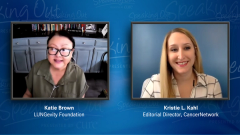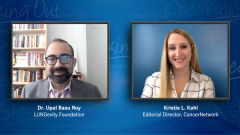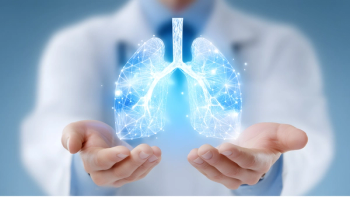
Beyond Lung Cancer Treatment
Kristie L. Kahl: What are some of the psychosocial issues that patients might face after receiving a lung cancer diagnosis?
Katie Brown: Lung cancer has long been a disease with a stigma. Patients can feel blame or guilt associated with outside perceptions or misconceptions about the disease. Many patients don't have lung cancer-specific support groups in their communities. And they can feel isolated and then add in the challenges of a pandemic. And we have patients who are feeling heightened anxiety and depression associated with the lung cancer diagnosis.
Kristie L. Kahl: Another area that we talk about a lot when it comes to the psychosocial aspect of lung cancer is scanxiety. Can you talk a little bit about scanxiety and how we can help patients?
Katie Brown: So scanxiety, which is the combination of scan and anxiety, affects patients in different ways. We suggest coping skills to help them through those times of heightened anxiety. Some patients recommend staying busy, increasing their support system during those times or utilizing counselors and therapy.
Kristie L. Kahl: Another area outside of lung cancer treatment that we talk a lot about is financial toxicity. Can you discuss how this can affect a patient with lung cancer and how we can address this issue as well?
Katie Brown: So, no one plans for a cancer diagnosis. When that happens, it's usually a big surprise. Almost every patient I've supported has reported some sort of financial toxicity or challenge. I think along with the information that comes about our disease, when we are diagnosed, is to let people know about financial resources that are available to them to help them through these challenging times.
Kristie L. Kahl: Why do you think something like support groups are so helpful for a patient that has lung cancer?
Katie Brown: Support groups give patients the opportunity to talk about things with people who really get it. So, they understand exactly what they're going through because they've been through it or they're going through the exact same things. They can compare their survivor stories. They can help each other through any challenging times and provide advice and resources and tips to help smooth the path for them.
Kristie L. Kahl: Why are support groups also important for an individual's loved ones?
Katie Brown: So, caregivers need their own set of resources and tools. They are absolute unsung heroes. Unlike patients, caregivers don't have a team of medical professionals taking care of them. So providing caregivers the ability to connect with other caregivers as mentors, I think is vital. We also provide tip sheets on many topics related to caregiving and lung cancer and caregiver challenges and offer tools for caregivers to help their loved ones and to help themselves.
Kristie L. Kahl: Can you discuss other resources that LUNGevity has available for patients to deal with challenges outside of treatment?
Katie Brown: Yeah, so we have a variety of online and virtual support communities. Our helpline, which is powered by oncology social workers, we have the lifeline peer-to-peer support program. We have educational events and free booklets and materials to download. We also have nutritional information. I think that's something that not a lot of people address. So, we have that as well as a navigation app that patients can download on their smart phone, and that can help keep them organized as well.
Kristie L. Kahl: To bring it all together, there's a lot that goes into a lung cancer diagnosis. What would you say is your biggest piece of advice for a patient who's facing a lung cancer diagnosis?
Katie Brown: So, of course, I would say visit the LUNGevity website. You can get plugged in there and learn about your type of lung cancer, biomarker testing and treatment options from our website. You can print off questions to talk to your doctor abouts. You get a bit of a better understanding of your disease and your treatment plan and to plug into the community. Our community is full of long-term survivors and they've walked the walk. And they have invaluable information. They are really the experts. So don't try to go it alone. For caregivers, you don't have to do everything on your own. We are here for you.






